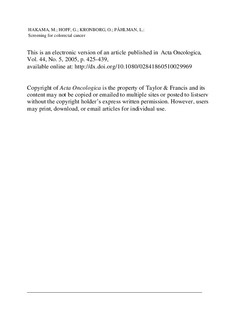| dc.description.abstract | Colorectal cancer (CRC) is the most common cancer in the Nordic countries after breast and prostate cancer. About 15 000 new cancers are diagnosed and more than 7 000 patients will die from CRC in 2005. CRC fulfils most of the criteria for applying screening; the natural history is well known compared with many other cancers. CRC may be cured by detection at an early stage and even prevented by removal of possible precursors like adenomas. Faecal occult blood test is the only CRC screening modality that has been subjected to adequately sized randomised controlled trials (RCT) with long-term followup results, using Hemoccult-II. Sensitivity for strictly asymptomatic CRC is less than 30% for a single screening round, but programme sensitivity has been estimated to be more. Biennial screening with un-rehydrated Hemoccult-II slides has shown a CRC mortality reduction of 15-/ 18% after approximately 10 years of follow-up in those targeted for screening. For those attending, the mortality reduction has been estimated at 23%. Denmark has decided to do feasibility studies to try to evaluate whether a population-based screening run by the community will have the same effect as has been demonstrated in the randomised trials. In Norway the government has accepted no formal population-based screening. In Finland, the Ministry of Social Affairs and Health made a recommendation in 2003 to the municipalities to run a randomised feasibility study with FOBT screening for colorectal cancer as a public health policy that is repeated every second year. In 2004 the first municipalities started. It has been claimed that today Sweden cannot afford CRC screening despite the potential mortality benefit. There is sufficient evidence for the efficacy of screening for colorectal cancer with fecal occult blood test every second year. There is, however, only little evidence on the effectiveness of screening when run as a public health service and there is insufficient knowledge of harmful effects and costs, even in RCTs. | |
